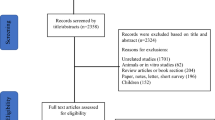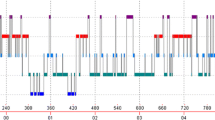Abstract
Purpose
Sleep disturbances are frequently reported in stroke patients and associated with the outcome of strokes. Using sleep questionnaires, we investigated the prevalence of classified sleep disturbance and the influence of sleep disorders upon a stroke prognosis.
Methods
Patients with acute ischemic strokes or transient ischemic attacks (TIA) were included. We investigated the prevalence of sleep disturbance and the association of outcomes resulting from strokes. The National Institutes of Health Stroke Scale score at day 7 (NIHSS-7) and modified Rankin Scale score at month 3 (mRS-3) stood for short- and long-term outcomes. A series of questionnaires including all Korean versions of the Pittsburgh Sleep Quality Index (PSQI-K), Insomnia Severity Index (ISI-K), Epworth Sleepiness Scale (ESS-K), Berlin Questionnaire, Sleep Obstructive apnea score optimized for Stroke (SOS), Beck Depression Inventory-2, and Hospital Anxiety and Depression Scale were used.
Results
A total of 241 (mean age was 64.2 ± 11.9, 146 males; 60.6%) consecutive acute ischemic stroke patients, including 36 TIAs, were enrolled. The NIHSS score at admission, NIHSS-7, and mRS-3 were 3.26 ± 3.64, 1.72 ± 2.29, and 0.21 ± 0.82, respectively. PSQI-K ≥8.5 was reported in 79 subjects (32.8%), ISI-K ≥15.5 in 29 (12.0%), ESS-K ≥11 in 21 (8.7%), and SOS ≥11 in 48 (20.3%). The NIHSS-7 was associated with the SOS (standardized β = 0.281, p < 0.001) and the mRS-3 with the ISI-K (standardized β = 0.219, p = 0.001) and the SOS (standardized β = 0.171, p = 0.011).
Conclusions
Screening for and intervening in the sleep problems of stroke patients could improve their outcome. As sleep disturbances are associated with short-term and/or long-term outcomes of strokes, active screening and intervention for sleep disturbances after strokes are needed.
Similar content being viewed by others
Abbreviations
- PSSD:
-
Post-stroke sleep disorder
- TIA:
-
Transient ischemic attack
- SDB:
-
Sleep-disordered breathing
- RLS:
-
Restless legs syndrome
- PSG:
-
Polysomnography
- NIHSS:
-
National Institutes of Health Stroke Scale
- NIHSS-0:
-
National Institutes of Health Stroke Scale score at day 0
- NIHSS-7:
-
National Institutes of Health Stroke Scale score at day 7
- mRS-3:
-
Modified Rankin Scale at month 3
- PSQI:
-
Pittsburgh Sleep Quality Index
- ISI:
-
Insomnia Severity Index
- ESS:
-
Epworth Sleepiness Scale
- BQ:
-
Berlin Questionnaire
- OSA:
-
Obstructive sleep apnea
- SOS:
-
Sleep Obstructive apnea score optimized for Stroke
- BDI-2:
-
Beck Depression Inventory-2
- HADS-D:
-
Hospital Anxiety and Depression Scale for depression
- -K:
-
Korean version of
- SD:
-
Standard deviation
References
Hermann DM, Bassetti CL (2009) Sleep-related breathing and sleep-wake disturbances in ischemic stroke. Neurology 73(16):1313–1322
Terzoudi A, Vorvolakos T, Heliopoulos I, Livaditis M, Vadikolias K, Piperidou H (2009) Sleep architecture in stroke and relation to outcome. Eur Neurol 61(1):16–22
Chen X, Bi H, Zhang M, Liu H, Wang X, Zu R (2015) Research of sleep disorders in patients with acute cerebral infarction. J Stroke Cerebrovasc Dis 24(11):2508–2513
Leppavuori A, Pohjasvaara T, Vataja R, Kaste M, Erkinjuntti T (2002) Insomnia in ischemic stroke patients. Cerebrovasc Dis 14(2):90–97
Chan W, Coutts SB, Hanly P (2010) Sleep apnea in patients with transient ischemic attack and minor stroke: opportunity for risk reduction of recurrent stroke? Stroke 41(12):2973–2975
Schlesinger I, Erikh I, Nassar M, Sprecher E (2015) Restless legs syndrome in stroke patients. Sleep Med 16(8):1006–1010
Adams HP Jr, Bendixen BH, Kappelle LJ, Biller J, Love BB, Gordon DL, Marsh EE 3rd (1993) Classification of subtype of acute ischemic stroke. Definitions for use in a multicenter clinical trial. TOAST. Trial of Org 10172 in Acute Stroke Treatment. Stroke 24(1):35–41
Sohn SI, Kim DH, Lee MY, Cho YW (2012) The reliability and validity of the Korean version of the Pittsburgh Sleep Quality Index. Sleep and Breathing 16(3):803–812
Cho YW, Song ML, Morinc CM (2014) Validation of a Korean version of the insomnia severity index. Journal of clinical neurology 10(3):210–215
Cho YW, Lee JH, Son HK, Lee SH, Shin C, Johns MW (2011) The reliability and validity of the Korean version of the Epworth sleepiness scale. Sleep and Breathing 15(3):377–384
Allen RP, Picchietti D, Hening WA, Trenkwalder C, Walters AS, Montplaisi J, Restless Legs Syndrome D, Epidemiology workshop at the National Institutes of H, International Restless Legs Syndrome Study G (2003) Restless legs syndrome: diagnostic criteria, special considerations, and epidemiology. A report from the restless legs syndrome diagnosis and epidemiology workshop at the National Institutes of Health. Sleep Med 4(2):101–119
Cho YW, Shin WC, Yun CH, Hong SB, Kim JH, Allen RP, Earley CJ (2008) Epidemiology of restless legs syndrome in Korean adults. Sleep 31(2):219–223
Netzer NC, Stoohs RA, Netzer CM, Clark K, Strohl KP (1999) Using the Berlin Questionnaire to identify patients at risk for the sleep apnea syndrome. Ann Intern Med 131(7):485–491
Camilo MR, Sander HH, Eckeli AL, Fernandes RM, Dos Santos-Pontelli TE, Leite JP, Pontes-Neto OM (2014) SOS score: an optimized score to screen acute stroke patients for obstructive sleep apnea. Sleep Med 15(9):1021–1024
Sung H, Kim J, Park Y, Bai D, Lee S, Ahn H (2008) A study on the reliability and the validity of Korean version of the Beck Depression Inventory-II (BDI-II). J Korean Soc Biol Ther Psychiatry 14(2):201–212
Zigmond AS, Snaith RP (1983) The hospital anxiety and depression scale. Acta Psychiatr Scand 67(6):361–370
Karaca B (2016) Factors affecting poststroke sleep disorders. J Stroke Cerebrovasc Dis 25:727–732
Del Brutto OH, Mera RM, Zambrano M, Lama J, Del Brutto VJ, Castillo PR (2015) Poor sleep quality and silent markers of cerebral small vessel disease: a population-based study in community-dwelling older adults (The Atahualpa Project). Sleep Med 16(3):428–431
Chen YK, Lu JY, Mok VC, Ungvari GS, Chu WC, Wong KS, Tang WK (2011) Clinical and radiologic correlates of insomnia symptoms in ischemic stroke patients. Int J Geriatr Psychiatry 26(5):451–457
Helbig AK, Stockl D, Heier M, Ladwig KH, Meisinger C (2015) Symptoms of insomnia and sleep duration and their association with incident strokes: findings from the population-based MONICA/KORA Augsburg cohort study. PLoS One 10(7):e0134480
Szymanski FM, Filipiak KJ, Karpinski G, Platek AE, Opolski G (2014) Occurrence of poor sleep quality in atrial fibrillation patients according to the EHRA score. Acta Cardiol 69(3):291–296
Zuurbier LA, Luik AI, Leening MJ, Hofman A, Freak-Poli R, Franco OH, Stricker BH, Tiemeier H (2015) Associations of heart failure with sleep quality: the Rotterdam Study. J Clin Sleep Med 11(2):117–121
Suh M, Choi-Kwon S, Kim JS (2014) Sleep disturbances after cerebral infarction: role of depression and fatigue. J Stroke Cerebrovasc Dis 23(7):1949–1955
Johnson KG, Johnson DC (2010) Frequency of sleep apnea in stroke and TIA patients: a meta-analysis. J Clin Sleep Med 6(2):131–137
Vgontzas AN, Liao D, Bixler EO, Chrousos GP, Vela-Bueno A (2009) Insomnia with objective short sleep duration is associated with a high risk for hypertension. Sleep 32(4):491–497
Chien KL, Chen PC, Hsu HC, Su TC, Sung FC, Chen MF, Lee YT (2010) Habitual sleep duration and insomnia and the risk of cardiovascular events and all-cause death: report from a community-based cohort. Sleep 33(2):177–184
Fernandez-Mendoza J, Vgontzas AN, Liao D, Shaffer ML, Vela-Bueno A, Basta M, Bixler EO (2012) Insomnia with objective short sleep duration and incident hypertension: the Penn State Cohort. Hypertension 60(4):929–935
Hackett ML, Pickles K (2014) Part I: frequency of depression after stroke: an updated systematic review and meta-analysis of observational studies. Int J Stroke 9(8):1017–1025
Choi-Kwon S, Han K, Choi S, Suh M, Kim YJ, Song H, Cho KH, Nah HW, Kwon SU, Kang DW, Kim JS (2012) Poststroke depression and emotional incontinence: factors related to acute and subacute stages. Neurology 78(15):1130–1137
Author information
Authors and Affiliations
Corresponding author
Ethics declarations
Funding
This work was supported by the National Research Foundation of Korea (NRF) Grant funded by the Korea Government (MSIP) (No.2014R1A5A2010008).
Conflict of interest
The authors declare that they have no conflict of interest.
Ethical approval
All procedures performed in studies involving human participants were in accordance with the ethical standards of the institutional and/or national research committee and with the 1964 Helsinki Declaration and its later amendments or comparable ethical standards.
Informed consent
Informed consent was obtained from all individual participants included in the study. Additional informed consent was obtained from all individual participants for whom identifying information is included in this article.
Additional information
Keun Tae Kim and Hye-Jin Moon contributed equally to the manuscript as first authors in this study.
Rights and permissions
About this article
Cite this article
Kim, K.T., Moon, HJ., Yang, JG. et al. The prevalence and clinical significance of sleep disorders in acute ischemic stroke patients—a questionnaire study. Sleep Breath 21, 759–765 (2017). https://doi.org/10.1007/s11325-016-1454-5
Received:
Revised:
Accepted:
Published:
Issue Date:
DOI: https://doi.org/10.1007/s11325-016-1454-5




